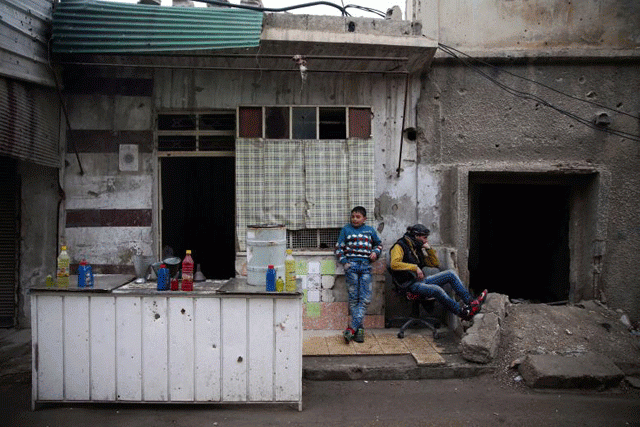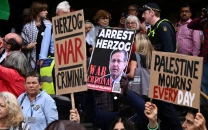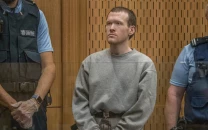UN envoy meets Syrian rivals, but hopes dim for peace talks
Momentum toward further talks was likely the best that can be hoped for, says UN Syrian envoy

People stand near a fuel stand in the rebel held besieged city of Douma, in the eastern Damascus suburb of Ghouta, Syria February 12, 2017. PHOTO: REUTERS
Staffan de Mistura began separate meetings with the Syrian regime and opposition delegates in Geneva, notably to discuss the agenda and the format for the negotiations proper -- the first UN-hosted peace talks in 10 months.
The opposition High Negotiations Committee (HNC) said Wednesday that it wants direct negotiations with the regime, but both sides would have to agree.
Neither regime delegation chief Basharal Jafaari nor opposition team chief Nasral Hariri spoke as they arrived at UN offices in the Swiss city.
De Mistura said he planned to host an opening meeting later in the day with both sides.
UN-backed Syria talks restart with rebels on back foot
On the eve of the talks -- the fourth brokered by the UN and the first since April last year -- Russia called on Syrian President Basharal Assad to stop bombing during the discussions.
But just hours after rival delegations arrived, de Mistura admitted there was limited ground for progress.
"Am I expecting a breakthrough? No, I am not expecting a breakthrough," the veteran diplomat said, noting that 'momentum' toward further talks was likely the best that can be hoped for.
An HNC spokesman said the umbrella group wanted face-to-face discussions with government representatives."
"We ask for direct negotiations... It would save time and be proof of seriousness instead of negotiating in (separate) rooms," Salem al-Meslet told AFP on Wednesday.
During three previous rounds of talks in Geneva last year, the rivals never sat down at the same table, instead leaving de Mistura to shuttle between them.
Syria rebels, regime enter first day of talks in Astana
This time, de Mistura has voiced hope that he will manage to bring the two sides together for direct talks.
The ground -- both in territory and diplomatically -- has shifted since the last UN-sponsored talks broke up in April 2016, and the rebels are in a significantly weaker position.
The army has recaptured the rebel bastion of eastern Aleppo and the United States, once staunchly opposed to Assad, has said it is reassessing every aspect of its Syria policy under President Donald Trump.
But the toughest issues remain similar to those in the last round in April 2016.
The latest truce was brokered in late December by opposition supporter Turkey and regime-backer Russia ahead of separate negotiations in Kazakhstan that also involved Iran.
The deal has reduced violence but fighting flared again this week including a government bombing campaign on rebel territory around Damascus.
The HNC charged that Assad was trying to send "a bloody message" before the talks resume.
A bitter dispute over Assad's fate also continues to divide the camps. The HNC has insisted he must leave office as part of any deal, while Damascus has said the president's future is not open for negotiation.
De Mistura's office has said that the talks remain focused on "political transition".
For the UN, that term can include a broad range of scenarios but the opposition sees it as implying Assad's removal.
Forcing the Syrian president from power had been the stated goal of Barack Obama's administration but Trump's election has muddied the US stance.
Trump has said that defeating the Islamic State group is Washington's top priority in the region and that the US would be narrowly focused on American interests.
On Thursday the US special representative to the Syrian crisis Michael Ratney was due to attend the opening ceremony, the US office at the UN in Geneva said.
The UN envoy acknowledged that the change of leadership in Washington had injected new uncertainties into the peace process.



















COMMENTS
Comments are moderated and generally will be posted if they are on-topic and not abusive.
For more information, please see our Comments FAQ